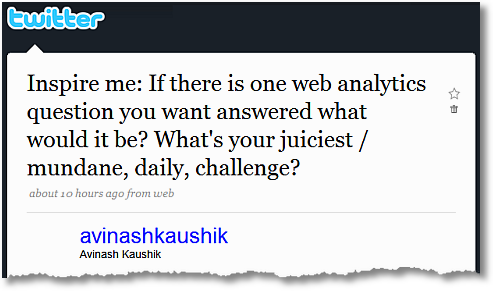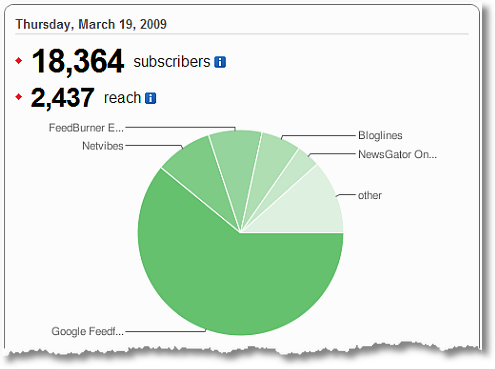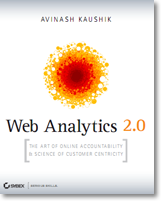When in doubt, ask your customers to help you.
I am quite fond of saying that in the context of using methodologies like Surveys and Experimentation and Testing in service of improving web experiences.
Today I used that idea in a different context, ask you what was top of your mind so I could try and answer some of them. My question was very open ended.
Here's my simple tweet :

I got a boat load of questions on my twitter and facebook accounts. Some were a delight, others were like "what?" :), and there were some that made me pull my hair out. [Is that social media in a nutshell? :)]
In this post I'll cover all the questions I got on Twitter. I'll answer the ones from Facebook in the next post (this one got too long!).
But before I go on one important point of emphasis.
It's all about Outcomes baby!
A lot of questions fell into this bucket "what should I do" / "where should I start" / "how can I convince xyz of something". I am going to answer all those questions with this: Focus on what the Outcomes are that you / your company is driving towards.
I know it is the lamest thing someone could say, it even sounds like a cop out. It is not. This game is all about Outcomes!
Let me go out on a limb and say there are only three types of Outcomes any website delivers (except of corner cases – all you anal retentive folks take two steps back!):
- Increase Revenue
- Reduce Cost
- Improve Customer Loyalty / Satisfaction
That's it.
 When in doubt ask your self if what you are doing falls into one of those three buckets. If it does, keep going. If not then I suggest you revisit what you are doing.
When in doubt ask your self if what you are doing falls into one of those three buckets. If it does, keep going. If not then I suggest you revisit what you are doing.
I know there might be others Outcomes, but for most "business" sites it will be about those three and their derivatives. [Business sites could be for-profits or non-profits, ecommerce or non-ecommerce, blogs or tech support etc.]
Let's get this puppy on the road.
A selection of your questions on Twitter and my answers. . . .
@JudithLewis : How do you convince people to look beyond page impressions for usable measurable metrics?
I am not trying to be glib here, but you have to show them how pathetic those kinds of metrics are. If your HiPPO's quite large then replace pathetic with primitive. : )
Recently I have started saying that the only metrics that truly help find actionable insights are those that measure / reflect customer behavior.
Page impressions is a "aggregate metric" (like Visits or Unique Visitors or Page Views). They are all great to know the What. But they are not truly reflective of customer behavior.
Examples of customer behavior metrics are Visitor Loyalty, Visitor Recency or Distributions of Depth and Length of Visits etc. All things Visitors actually do on your site.
So the first time give them Impressions.
The next time be an Analysis Ninja and give them a little extra analysis focused on something related to outcomes ("we had these many page impressions but Visitors that came from source x had more impressions" or "I dug a bit deeper and found at the first page impression was key in getting people not to bounce and see more impressions" etc etc etc).
Change the world, one small step at a time.
@mthinker : How do we account for the one viewer who has more than one machine? for the user who is selectively blocking scripts?
Short answer: You can't.
Long answer: You can't. But….
If you have a non login, non spyware site like say this blog then "people" are transparent to you/me. I use cookies (see my privacy policy) and as you switch computers (or browsers on the same computers) you are a different Unique Visitor to me.
If you have a login site, like say www.turbotax.com (buy tax software from them!), where people are not logged in by default, then it is a bit difficult for you to "stitch" their behavior into one piece. But if you extract data our of your analytics tool or switch your unique tracking to something like the login id (that you have stored in a cookie or pass to your analytics tool in some other way) then for those that do log in you can "stitch behavior".
If you have a login site, like say www.amazon.com, where anyone who has shopped there is logged in my default then that makes it easier to "stitch behavior".
To the last part of your question, if they are blocking scripts then you are out of luck with your javascript tag based solutions (Google Analytics, Omniture, IndexTools, WebTrends etc). But if you use log based solutions (Urchin, WebTrends etc) then you can still track these folks. Expect a minor nightmare trying to "merge" the two sources together.
Important. Do ask yourself this question: What is the ROI for perfection? or Do I really need 100% "accuracy" to do my job and create a great site?
There is more data on the web than on any other channel (TV, Radio, Magazines etc). It is a lot more and with a lot more confidence (just dig one inch below the surface of how TV is measured). Even with no cookies, even with cookie deletion, even with people switching computers you can make decisions and improve your site and add to your bottomline.
Don't get conned into chasing your tail (and let me stress I am not saying that you in particular are!). Leave that to Consultants, Gurus, Bloggers (me!).
Bonus reading: Perfection Is Dead, Long Live Perfection
@seanpower : How do you define and measure ROI in social media? SM is great, but when is active participation enough or overkill?
Outcomes baby! : )
I have to admit that I think that any company should participate in Social Media simply because it is important to be where your customers are, it is important to be a genuine part of the conversation.
It does not cost much (just buy Red Bull for the knowledgeable 23 yr old in your company). It can yield long term ROI.
With that in mind the most important measure of ROI is to know that you are actually participating in the conversation and (more importantly) creating conversation.

So for blogs it is measuring RSS Subscribers (people want to pull your messages, yea!), Ripple Index (using technorati "authority" until something better comes along, no not Google Blog Search!) and Conversation Rate.
More here: Blog Metrics: Six Recommendations For Measuring Your Success
For Twitter there are such measures as well. To me twitter is a great channel to magnify your message (if it is of value). So I use retweetrank.
So is IntelSoftware doing better than avinashkaushik? No. How about TXInstruments? Yes!
It's a simple example of Outcomes (magnify the message), but should give you a feel for how to move forward.
@mlvalentine : Most of my WA challenges are w/ explaining how it works and why it won't add up like a balance sheet to non-WAs.
I wish I had a good answer, I don't. It is pretty hard.
What is worse is that we live in a world where most Sr. Management / Decision Makers (and many Web Analysts!) have grown up in a world where two plus two equals four. Not three point five or four point seven.
It is really hard to change their minds, or get them to believe that anything that does not add up is still worth a lot.
In my career I have always tried to show that the data collection is as rigorous as possible (clean tags, first party cookies etc) and then switch to showing value from what is available.
For example even with 90% confidence it is hard to argue with actionability of most web analytics data. Or even with 70% confidence. We just have so dammed much and there is so much in there of value.
There is a list of why data won't be clean in this post: Data Quality Sucks, Let’s Just Get Over It
It also contains a six step plan that you can execute to win your lovely HiPPO's over.
@nectarios : How do you convince c-level execs of the power of web analytics and more importantly to invest in the human power necessary?
You are in luck. I have a specific post that covers just this:
Here are the five specific recommendations:
# 1: Implement a Experimentation & Testing Program.
# 2: Capture Voice of Customer. Surveys, Remote Usability, Whatever.
# 3: Deploy the Benchmarks I Say, Deploy ‘em Now!
# 4: Competitive Intelligence is Your New Best Friend.
# 5: Hijack a Friendly Website (/ Earn Your Right to be Heard).
Check out the details in the post.
@midlakewinter : For a blog & corporate site on same domain. Measure together or as separate entities?
To a great extent it depends on your company, the types of customers you are targeting and their technical sophistication. So do please consider that.
But.
Based on my experience in analyzing a bunch of these cases I have come to realize that it is often optimal to measure them as separate entities because they tend to solve two different problems.
A good example is Bonobos. The site is at http://www.bonobos.com/ and the blog is at http://www.bonobos.com/blog/

I had analyzed their site last year for Inc Magazine and one of the things the data showed was that the audience that came to the blog would buy some pants from time to time but mostly they were there for the community and learning what the company was up to etc. So high bounces (which is ok in this case) etc.
On the other hand the "corp" site was there as the main store front, to attract and covert new visitors, to sell etc. While some of them would read the blog and perhaps be convinced to buy the pants, that was a small number.
The content consumption pattern (and Primary Purpose!) of each audience was different so it would have been optimal to measure and report separately.
Just as a small example high bounce rate in one case would be ok, but not in the other. So you could understand data better.
I have seen this frequently. Hope this helps you with a framework of how to think of deciding in your case.
[Full disclosure: I did not get a pair of pants for doing the bonobos analysis. Though it would not have hurt my feelings if I had gotten one! :)]
@brandingme : Can i pass a techie question by you?!?!?! see explanation here:
I'll summarize Adrian's issue.
He was using this to track a link to a flash app:
http://www.example.com/#/register?utm_source=source&utm_medium=medium&utm_campaign=campaign
The # does not work optimally.
So he moved to this:
http://www.example.com/?utm_source=source&utm_medium=medium&utm_campaign=campaign/#/register
The problem is that it works. Ok that is not his problem. :) His problem is that he does not like the url stem to stay, its "ugly". [Did I get that right Adrian?]
Here is what can be done in this case.
You can still use the first url stem /#/register? but you'll use a special Google Analytics function called setAllowAnchor.
Here's more information on exactly how to use setAllowAnchor.
Then birds will sing, the sun will shine and life will be a bed of roses. :)
[I want to thank my buddy Nick for helping me with this answer.]
@Omni_man : I'd be interested in best practices of connecting online browsing to offline success when there is little to connect the two.
Adam is absolutely right, with the missing Primary Key to tie the two data sets it is really hard to connect online (anonymous) visitors to, say, store visits.
If people say they can do "holistic view analysis" or "multichannel magnificence" easily then view them with suspicion. Please. Especially if they are selling you a tool. Pretty please.
There are some cases where the Primary Key exists and this is possible. Two good examples are www.walmart.com and www.safeway.com where online Visitors and, surely, online Purchasers are encouraged to use their Store Card (safeway) or pick up in a store (walmart). Both of those things with some difficulty allow you to merge the data and get a offline to online view.
Remember it would still happen outside your web analtyics tool, usually in a corporate data warehouse.
So what about the rest of us?
You can follow seven different strategies to measure Multi Channel impact. Each will give you a better idea of a website's incremental offline impact (even if not as direct as we discussed above).
Here's the post: Tracking Offline Conversions: Hope, Seven Best Practices, Bonus Tips
[Dear Readers: If you use Omniture I highly recommend Adam's blog, it is very good.]
@jarmes : I want analytics data justifying the removal of main navigation :-)
I commend you on your bravery. :)
You have only one option: Test!
More here:
Let me know how it turns out.
@ncabane : My juicest. mundane daily challenge is to attract people to my blog and to the company i work for, using analytics.
Use tools like Insights for Search to identify related keywords and optimize your paid search and organic efforts to attract a wider repertoire of searchers.
Absolutely positively have a search long tail strategy, that's were the "impression virgins" are.
Use tools like www.compete.com to do a diff between your referrers and your competitors referrers. Then steal them!
Its the Referral Analytics report, looks like this (comparing www.intel.com and www.amd.com):

Seriously though far too often we focus on our own web analytics data, Google Analtyics and Omniture and WebTrends and what not. What you want is to look outside, that's were joy exists.
@Edw3rd : A hard question is determining salability (predictability) of a particular approach or campaign…success is historical
This is the problem with twitter, 140 characters are simply not enough.
So Edward I don't really understand your question. But let me try. . .
With regards to campaigns it is important to realize there are three problems that stymie your ability to replicate success or, importantly, scale it.
1) Diminishing Margins of Return. You will surely hit this, all the time. So just because this campaign worked so well from 100 to 10,000 users, you can bet every use after that will be really hard.
2) Inventory. Most of us don't realize there is a finite inventory out there. For people who search for something. For people who want to buy something from you. For your raw ability to keep succeeding. These are usually hard to predict.
3) You got lucky. There is no other channel quite as complex as the web, in terms of the number of variables. It is also friction less. So your past success for a campaign, or a series of campaigns could be 100% luck. It could be because of things your competitor did. Or that it was your lucky day and you got on the front page of www.digg.com . Or….
Keep those three things in mind. The only way out? You try, you live, you learn. Remember the greatest gift the web gives you is the ability to fail faster (cheaply).
Hope I am a bit close to what you wanted to know.
Bonus Read: Data Mining And Predictive Analytics On Web Data Works?
@tonysingh : What are the key measurements for media sites?
I am sure you know all the ones related to ad sales etc etc.
Let me recommend two more: Visitor Loyalty and Visitor Recency .
I fundamentally believe that many media sites focus first on making money and secondarily on creating loyal customers. It should be reverse.
If you want my humble prescription for media sites (publishers) then here it is:
@airsibel : Missing or inaccurate data that does not align with database figures. Perfect data in web analytics, is it an Utopia?
Sadly it is difficult to achieve, its just the nature of the beast. For now.
Things will change.
But this does not mean you can't take action. The first post has a six step action plan you can follow, the second shares my view of the value of perfection:
@itwop : What insight/action does my competitor get out of his analytics that I'm overlooking/ignoring?
The only way to find out is call her! :)
@abba_dad : What did my customers do before/after/between visits to my website?
For before you'll get some clues in your referrers, keywords, etc data.
For after use the Destinations report in Referral Analytics in Compete.
For between visits, call them (your customers)!
@pere_rovira : What reports should i look at today and why?
The best person to answer that question is you.
If I had to recommend one simply based on what is in that tweet, I would say focus on reports that measure one or all three of the Outcomes mentioned at the start of this post.
Because that will ensure you'll show value of your job / consulting contract.
@wuterence : Where Does the Everyday Marketing Manager Start????
I have the most perfect blog post for you:
Hurray, all done!
I hope you had fun and found the answers to be relevant and meaningful to you in some small way, even if you did not ask the question.
Ok now your turn.
Would you have answered these questions as I did? What would you have done differently? Please add your own thoughts.
Thanks.





 Via
Via 














Excellent!
Helpful to answering several of these questions might be "value of the event". Does it make sense the analyst should worry more about the measurement precision of high value events than low value events? Of end conversions over visits, for example? I think so, a "scaled" approach to precision helps you allocate your time to highest and best use – and by default, your reporting will be closer to the "balance sheet".
Re: "fundamentally believe that many media sites focus first on making money and secondarily on creating loyal customers. It should be reverse".
Yes, yes, yes! If we could only convince them this is true. The only major model on the web that seems not to care about ongoing (Loyalty, Recency) behavior. "Repeat Visitor" measurement is *not* the same as cumulative Frequency.
Nice post Avinash, I was looking for some inspiration on ideas to improve our in house analytics app and this post gave me some great ideas. Currently we focus a lot on keywords and descrete visits but you reminded me that looking at a complete visitor experience would also be useful in our case.
Thanks
Good stuff– from methodology (using SM to gather questions) to execution (writing on your blog and publicizing it back in the SM channel). Thanks for the answer to my question. My favorite was the answer to how to get the C suite in–Embarrass them. Beautiful. I can say from experience it works but I never thought of it as simply as that. thanks Avinash. Now if we could just do something about those damned ratings panels…
I also think type of content on Media sites is key. The better understanding you can get around how content subject marries with user behaviour is key in allocating resources. What subjects has higher return frequency.
First off, thanks for taking the time to answer my question and share my frustration.
Avinash, you had written: "In my career I have always tried to show that the data collection is as rigorous as possible (clean tags, first party cookies etc) and then switch to showing value from what is available."
I'm going through this process right now, and I'm finding that the first part (i.e. showing the data collection is "rigorous" and accurate) is necessary for both WAs and non-WAs because it builds a basis for a "common ground."
To scale the project in digestible terms, I'm breaking out the WA conversations by the "Whats" before I get into the "Whys." (i.e. email campaigns, PPC, affiliates, etc.)
So far the technique is working, but I can see where it might not work that way all the time, especially if some WAs are confident they've already done the "rigorous" proof testing.
http://www.twitter.com/mlvalentine
Avinash,
Great responses to tough questions! I like how you boil down website outcomes into three simple chunks. To illustrate even one of them, I was talking to a large search engine (ahem) the other day, where I learnt that they can directly correlate sentiment in social media (# of positive mentions, # of neutral mentions, # of negative mentions) to increases and decreases in conversions.
This is a great example of the correlation between improvement of customer satisfaction with an increase in revenue.
Thanks again for the response to my question. As always, you continue to spread great wisdom.
Thanks Avinash!
I'm already looking at the tools and data you gave me!
Great post! I loved the line:
"It does not cost much (just buy Red Bull for the knowledgeable 23 yr old in your company). It can yield long term ROI."
I'm glad to know that I'm not the only one who feels like they are fighting an uphill battle in trying to get people to understand the importance of analytics.
Hey Avinash, I've been reading some of your blog posts and I'm impressed with your knowledge of Web Analytics. Your responses to all the questions were thoughtful and well presented. I agree with your assertion about the "outcomes", outlined below.
1.Increase Revenue
2.Reduce Cost
3.Improve Customer Loyalty / Satisfaction
The challenge many BI managers face – is to determine which success events or KPIs can help drive these outcomes. I see the outcomes as top level strategic initiatives – we need to identify the KPIs & Drivers and then devise tactical initiatives to help exceed pre-determined goals.
My two cents,
Rotimi
Avinash,
Thank you so much for taking time to answer my techie question :D
Here's the simple(?), boiled-down version of my question: if the tagged link doesn't disappear throughout multiple pageviews, does that mess with the data?
Here's the detailed story:
Our clients have extremely high-end products, and as such prefer the "sexy", all-Flash websites (for all you SEO's out there cringing right now, we control for all-Flash with a lot of different features to make search friendly). Anywho, we deep-link the Flash sites with SWFAddress, which integrates better with Google Analytics. So, as someone navigates through the site, after clicking on an ad they go through:
example.com/?utm=etc=etc=etc
example.com/#/amenities
example.com/#/press
example.com/#/neighborhood
example.com/#/contactus
We tag all our online advertising, and we wanted the link to also go to a specific page on the site: example.com/#/register. The problem was, when we tagged the link to:
example.com/#/register?utm=etc=etc=etc
it didn't go to that part of the movie. So the designer suggested we change to
example.com/?utm=etc=etc=etc/#/register
and it worked. But, being that I am still new at cookies, JavaScript, I don't know if it will affect the data for people to now go through our site like this (I don't mind that it doesn't look pretty):
example.com/?utm=etc=etc=etc/#/register
example.com/?utm=etc=etc=etc/#/amenities
example.com/?utm=etc=etc=etc/#/press
example.com/?utm=etc=etc=etc/#/neighborhood
So, does keeping that tag through every page view mess with the data? Any ideas on how to test?
THANK YOU!!! (is it okay to shout nice things here?)
Analytics has become the key for analyzing the ROI of any business and you have ascertained this fact in all your blog posts. I appreciate your efforts for gathering these questions and answering it effectively.
There's a question in our company, SalesOnlineWorld.com for guys who excel in Analytics. 'Are you learning for becoming Avinash Kaushik?' ;)
Thanks for your answers. Keep rocking us with great views and suggestions like this!
Avinash, good job on being a true evangelist! And please do this more often! I have a question though: why is Google Analytics limited to 25 website accounts to one GA account? I get tired of logging in and out with 3 different accounts. Is there a way to get more accounts?
About the "blog & corporate site" analyst question, Should he use 2 different profiles or 2 different tracking code id?
Jim: I love the framing you have laid out in your comment. The choice of first improving precision closer to the end (high value events) and then working backwards as time & effort justifies.
Perhaps we all get stymied because we start off trying to digest "the entire tree" (improving precision in aggregate) which is so hard and perhaps a waste of time.
It is ok for me to borrow and present the mental model you have laid out here?
Monica: See what Jim Novo wrote in his comment, the first one in that post. Very important for all of us to internalize his guidance.
Also check out the first part of this post:
Accuracy, Precision & Predictive Analytics
It is me covering something awesome Jim has said about Accuracy and Precision.
So all that is just context about how we should think.
As to your specific issue I think you can use tools like Maxamine (robust, powerful, expensive) or WASP (a bit limited, but very affordable and very good) to ensure tags are right, in the right places etc. You will have to put rigorous processes in place to ensure campaigns are tagged (but its easier if you tell Marketers: "Look you don't tag your campaigns, you don't get no credit. Get on the bus!").
Check out the specific ideas here:
The Ultimate Web Analytics Data Reconciliation Checklist
It is hard, but doable. Remember you are going for Precision not Accuracy.
Good luck!
Rotimi: I agree that it is hard. But IMHO BI Managers (and I was one for five years!) need to think like Marketers, and I mean really think.
I think this blog post might help spark some ideas:
Excellent Analytics Tip #13: Measure Macro AND Micro Conversions.
My way of saying let's think more broadly and be adamant about quantifying holistic economic value.
Jorge: It would really depend on what you are trying to. I am sorry it seems like such a cop out. I just want to stress that each choice comes with pros and cons, think it through carefully. If this is for Google Analytics, do a quick consult with a GAAC before you choose. If you have Omniture or WebTrends or IndexTools etc then talk to them first.
With that out of the way, I have almost always chosen to start with two different profiles (GA lingo there). When I implement the code I can make choices about setting cookies in a way that I can make it work like two diff codes or one. In rare cases I have switched to diff tracking codes, due to analytical needs.
-Avinash.
Fantastic post Avinash. I continue to be supremely impressed with the depth and breadth of your knowledge. You intelligently touch on so many different facets of the world of web analytics. Bravo.
In this post I like the clean framing on the three outcomes. It is simple, yet sophisticated.
We have struggled at my company to figure out what we solving for. Your framing will help crystallize our thinking.
I also love the constant emphasis you have on not trying to get stuck in how-good-is-my-data-really trap.
Thank you.
Awesome!
I really enjoyed reading through all the comments.
THANKS A MILLION!
Thanks for posting my question Avinash. I was actually alluding to visitor behavior outside of the web channel, which can't be captured by traditional web analytics techniques. But I liked your answer about calling the customers between visits.
Hi Avinash,
I like the 3 categories of goals you outlined above.
You know I'm not a web analytics expert (yet?;)), but trying to run my own sites…but that's something I see that with people (who are trying to create profitable websites) all the time.
They spend a lot of time creating logos, changing their design 5 times a year, trying to make it better-looking basically. And it always makes me want to ask them (I actually used to ask, but Ive given up :P):
"How is this going to make your website more profitable?"
Of course they can't answer it, yet they believe it's super important to work on their design and their logos as much as on their marketing efforts (I'm talking about people whose main priority with their sites is making money) – not saying that these things can't have an impact, but I guess you get the idea.
Actually, Ive let the same thing happen to myself before: On my first design I was trying to figure out how to make the button of the left navigation menu appear highlighted (to show which page the visitor is currently on). I didn't know much about web design back then and eventually realized: I'd have to put a days work (or more) into solving that problem, now and my ROI will have probably improved by exactly 0%. Talk about flushing ressources down the toilette ;-).
Ive thought (and talked) about this before, because I believe this is something that is (utterly) important in every field where technology and business/marketing merge: Many "tech guys" don't approach technology issues with that mindset (that mindset of only caring if whatever it is can actually improve ROI).
Do you think being goal-focussed (on business goals…not actioning anything that doesnt improve ROI) is something anyone can learn…or is it more of a personality trait that some people just don't "get"?
@Adrian: Have you heard of a guy called Brian Ussery aka Beussery (an SEO who specializes in flash). He has blogged about SEO & flash quite a bit(the only SEO I know who doesnt cringe at the thought of an all-flash site ;))! (I hope this is okay, Avinash..)
@Patrick: Thanks for the heads up, I'll have to look through his archives ;-)
Hi Avinash,
Thanks for another interesting post!
Let me go out on a limb and risk being one of those anal retentive folks, by making this comment:
1. Increase Revenue
2. Reduce Cost
3. Improve Customer Loyalty / Satisfaction
These are the outcomes of a website as you say. But to be perfectly clear, shouldn't we say these are the "wanted" outcomes of a website? After all, many many websites have quite the opposite "actual" outcome:
1. No revenue
2. Increased cost
3. Impaired customer loyalty / satisfaction
There are:
things you know
things you know you don't know
and
things you didn't even know that you didn't know.
I guess I don't know a lot of what I don't know. Thanks for this post Avinash.
First, I'm really enjoying your blog.
When it comes to visitor stats, one metric doesn't drive behaviour:
rev/visit
page views/uniq visitor
orders/uniq visitor
It should measure behavior and help focus efforts.
What is the analytic support to google knol? As an author I do not see any support from all this complex analytic capability of google.
Hey Avinash, thanks for your feedback. I agree totally that BI Managers need to think more like Managers. I've worked in the Digital Marketing space for a few years – and I recently took on a BI Mgr role.
I wondered if you have any guidance on how BI Managers can effectively merge qualitative and quantitative metrics together in order to derive useful insights.
We run customer satisfaction survey's through comscore, on our site. We also use Omniture to measure quantitative metrics. I'd like to merge survey data with traffic pathing trends in order to better understand how to improve CSAT on our site. Have you worked on similar initiatives in the past? Any learnings or insights which you could share, would be much appreciated.
Thanks……
Like always, an excellent post.
I completely agree with your emphasis on Outcomes. Like any other channel, the social media strategy needs to start with a goal in place.
Whatever marketing we have seen on social media till date is marked with (random)Ad hoc practices. I am yet to see a good strategy implemented. The process needs to get a top-down push with a centralized strategy for marketing on social channels.
Strategy [Goals,Process,Metrics] + Means to Implement [Tools, Team] = Winner!